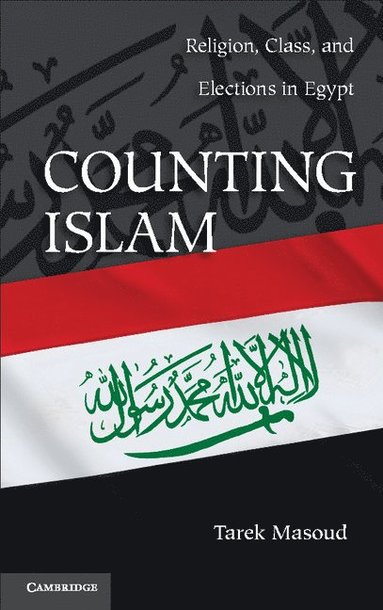
- Format
- Häftad (Paperback)
- Språk
- Engelska
- Antal sidor
- 276
- Utgivningsdatum
- 2014-04-28
- Utmärkelser
- Hubert Morken Best Book Award, Religion and Politics Section, American Political Science Association One of Monkey Cage's Best Middle East Political Science Books
- Förlag
- Cambridge University Press
- Illustrationer
- 45 b/w illus. 22 tables
- Volymtitel
- Counting Islam: Religion, Class, and Elections in Egypt
- Dimensioner
- 228 x 152 x 15 mm
- Vikt
- Antal komponenter
- 1
- Komponenter
- 2:B&W 6 x 9 in or 229 x 152 mm Perfect Bound on Creme w/Gloss Lam
- ISBN
- 9780521279116
- 385 g
Counting Islam
Religion, Class, and Elections in Egypt
- Skickas från oss inom 7-10 vardagar.
- Fri frakt över 249 kr för privatkunder i Sverige.
Passar bra ihop
De som köpt den här boken har ofta också köpt Before Crisis av Timothy Sellnow, Deanna Sellnow (häftad).
Köp båda 2 för 935 krKundrecensioner
Fler böcker av Tarek Masoud
-
Arab Spring
Jason Brownlee, Tarek Masoud, Andrew Reynolds
-
Order, Conflict, and Violence
Stathis N Kalyvas, Ian Shapiro, Tarek Masoud
-
Defending Democracy in an Age of Sharp Power
William J Dobson, Tarek Masoud, Christopher Walker
Recensioner i media
'This book provides the most compelling explanation yet for why Islamist parties have stunned autocrats and oppositionists across the Middle East. With a breathtaking set of data collected in the field, Tarek Masoud demonstrates that the Egyptian Muslim Brotherhood won elections through a combination of luck and political savvy, not sermons or social services ... Lucidly written for scholars, students, and policy makers, Counting Islam offers unparalleled insight into the maelstrom of repression and faith engulfing the Arab Spring.' Jason Brownlee, University of Texas, Austin, and author of Authoritarianism in an Age of Democratization and Democracy Prevention
'This book asks an important question: why do poor Egyptians turn their backs on pro-poor leftist parties and instead vote for religiously conservative parties such as the Muslim Brotherhood and the Salafi Nur Party? Drawing on a combination of qualitative and quantitative evidence, Masoud discounts suggestions that they do so because they prioritize faith above material interests. Instead, he shows that most Egyptians who voted for the Muslim Brotherhood in Egypt's first democratic elections did so because it was better able than its secular rivals to convince them that it would redistribute wealth and shore up Egypt's social safety net ... This empirically rich, carefully argued book is an essential contribution to the literature on political Islam, religion and politics, and political parties in new and developing democracies.' Amaney Jamal, Princeton University, and author of Race and Arab Americans Before and After 9/11 and Barriers to Democracy
'The Islamist sweep of elections in the Middle East has been a source of both curiosity and worry. Tarek Masoud relies on data from four decades of electoral politics in Egypt to show that the power of Islamic parties comes not from religious rhetoric but rather from the ability to speak to the material concerns of voters. This is an important book, meticulously researched, well-written and clearly argued. It demystifies Middle East politics and goes to the heart of the most important questions asked about the role of Islam in politics. An important corrective to popular misperceptions at a critical historical juncture, this book is a must-read for academics and policy makers alike.' Vali Nasr, Dean, Johns Hopkins University Paul H. Nitze School of Advanced International Studies, and author of The Rise of Islamic Capitalism and The Dispensable Nation
'In Counting Islam, Tarek Masoud asks how Islamists have performed in Egyptian electoral politics, both under authoritarianism and in their sweeping victories in the democratic elections that followed the overthrow of Hosni Mubarak in 2011 ... Ultimately, Masoud's theory posits an intriguing causal mechanism: Institutional embeddedness provides opportunities for communication that shapes perceptions.' Rana B. Khoury, Arab Studies Journal
Övrig information
Tarek Masoud is an Associate Professor of Public Policy at Harvard University's John F. Kennedy School of Government. His writings on political Islam, Egyptian politics, and US foreign policy have appeared in the Journal of Democracy, the Washington Quarterly, Foreign Policy, the New York Times, and the Wall Street Journal, among others. He is the co-editor of Problems and Methods in the Study of Politics (Cambridge, 2004) and Order, Conflict, and Violence (Cambridge, 2008). He was named a Carnegie Scholar by the Carnegie Corporation of New York, and received the 2009 Aaron Wildavsky Prize for best dissertation in religion and politics from the American Political Science Association. He is a recipient of grants and fellowships from the National Science Foundation, the Paul and Daisy Soros Foundation, and the Harvard Medical School, and is a term member of the Council on Foreign Relations. He holds a PhD from Yale University and an AH from Brown University, both in political science.
Innehållsförteckning
Introduction: Islam's steady march; 1. Explaining Islamist dominion; Part I. Elections under Authoritarianism: 2. Clientelism and class: the tragedy of leftist opposition in Mubarak's Egypt; 3. The Islamic machine?; 4. Winning in the 'well-run casino'; Part II. After the 'Arab Spring': 5. God, mammon, and transition; 6. Islam's organizational advantage?; 7. Conclusion; Epilogue: requiescat in pace?
Du kanske gillar
-
How to Invent Everything
Ryan North
Inbunden -
Hillbilly Elegy
J D Vance
Häftad -
Source Code
Bill Gates
Inbunden -
Pornography
Andrea Dworkin
Häftad


